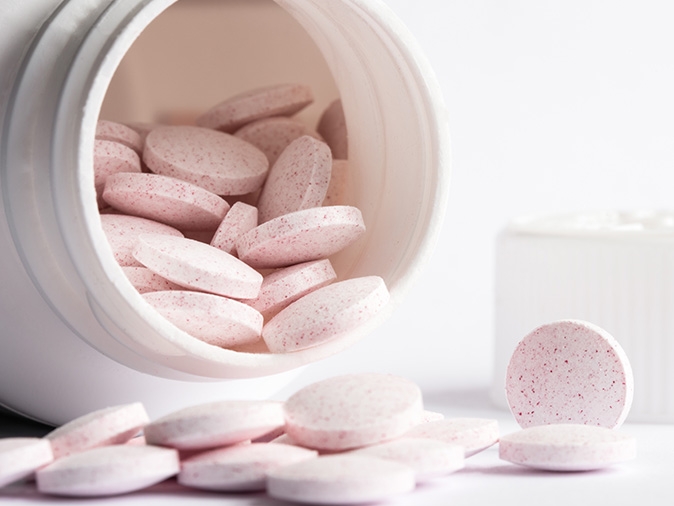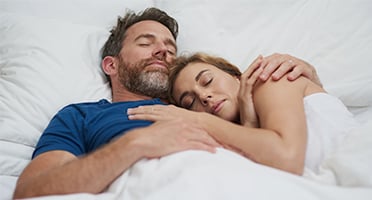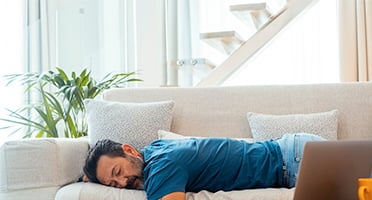27.4% of adults take melatonin as a sleep aid, according to the Sleep Foundation. Most of those say that it helps them fall asleep faster and take it on average four days per week. Melatonin pills are widely available over the counter in drug stores and grocery stores but it’s also a natural hormone that our bodies produce as a response to darkness to help us fall asleep. So, if our bodies make melatonin naturally, wouldn’t it be okay for those with sleep apnea to take more of it? Simply, no. Melatonin is not recommended for those with sleep apnea. Here’s why.

How does melatonin work?
Melatonin doesn’t actually put you to sleep. It helps to encourage sleep and control your sleep cycle. As the sun goes down, your brain releases melatonin to help you get ready to sleep. Your muscles relax, your thoughts slow, and you start to get tired. That’s why you may feel more tired in the winter versus the summer—because it gets darker earlier, and your brain releases melatonin earlier. Your natural melatonin peaks in the early morning hours and reduces as it gets lighter. an>
Melatonin as a supplement works similarly, except you take it orally, and it peaks an hour after you take it. It takes about 20 to 30 minutes to start working but can stay in your body for 4 to 8 hours. It can help you fall asleep and make you less likely to awaken during the night.
What happens during sleep apnea?
Obstructive sleep apnea is the most common type of sleep apnea. It occurs when there is a blockage in your airway that narrows or completely obstructs the flow of oxygen to your body. Your body senses this lack of oxygen (and excess CO2) and awakens you to resume breathing.
A blockage in your nasal passage can cause obstructive sleep apnea, but most often, it’s an issue of your upper airway muscles (tongue) sagging. Your tongue relaxes during sleep and falls back into your airway, making it near impossible for you to breathe.
If you have sleep apnea, you awaken each morning without remembering your awakenings during the night. You’ll feel groggy, have a headache, and start to feel irritable often. Many people will lose enjoyment in what they used to like, and their relationships with loved ones, friends, and coworkers suffer, among other dangers.
Why Melatonin and sleep apnea don’t mix
Can you take melatonin with sleep apnea? Here’s why you shouldn’t.
- Obstructive sleep apnea is caused by relaxed upper airway muscles.
- Melatonin gets your body ready for sleep, in part, by relaxing your muscles.
- So, when you take melatonin and have sleep apnea, you’re making your upper airway muscles sag even more, worsening your sleep apnea.
You might think, “but it’ll still help me stay asleep.” Unfortunately, no. Your survival instincts are stronger than the melatonin, so you’ll still awaken during the night. However, you’ll go longer without oxygen during each apnea episode due to the melatonin.
How to tell if you have sleep apnea or something else?
The only way to tell if you have sleep apnea or another sleep disorder is through a sleep test. If you’re experiencing these symptoms, you may want to look into SleepTest.com’s home sleep study. Take the sleep quiz or peruse the symptoms below.
- Daytime sleepiness
- Waking up unrested
- Morning headaches
- Dry mouth in the morning
- Dozing off at work, while driving, or in front of the TV
- Memory problems
- Lack of motivation
- Low energy or fatigue
- Excessive appetite
- Weight gain or inability to lose weight
- Loss of interest in hobbies or pastimes
- Nightmares
- Waking up to urinate
- Irritability or moodiness
- Diminished sexual interest, performance, or satisfaction
- Snoring
- Gasp or choke during sleep
- Grind or clench your teeth
- Sleep restlessly
If these symptoms sound like you, it’s time to order your at-home sleep study. A sleep study will help you determine if you have sleep apnea. SleepTest.com works with sleep doctors that will analyze your sleep data and make recommendations on treatment options. This can be done completely through telemedicine, so you don’t need to take extra time away from your day. The home sleep study is easy to use and can be done on two consecutive nights at your convenience. Order your at-home sleep test today to treat or eliminate the possibility of sleep apnea.
Order your home sleep test and elevate your sleep
Knowing why you can’t sleep is the first step in getting back to a good night’s sleep. Using melatonin to help you sleep when you don’t know the cause of your restlessness could do more harm than good. Order an affordable at-home sleep test today.

Love can be fiery and passionate or sweet and steady—but snoring? Not so much. Whether you're in the honeymoon phase or years into your journey together, snoring can shake up a relationship. With Valentine’s Day around the corner, let’s take a fun look at how snoring can impact your love life.

New Year’s resolutions are made with the best intentions—hitting the gym, eating healthier, and committing to self-improvement. Millions of people dive in, signing up for memberships, filling their fridges with fresh produce, and stacking self-help books on their nightstands. But as the months go by, workouts slow down, nutritious meals are replaced with convenience foods, and those books remain unread. Why do so many resolutions fail? One major factor that often gets overlooked is sleep. Poor sleep can derail motivation and energy, making it harder to stick to your goals. Let’s explore how a sleep test could be the key to staying on track.




